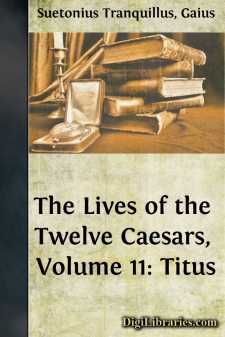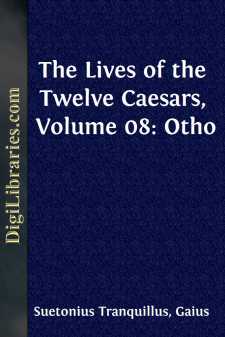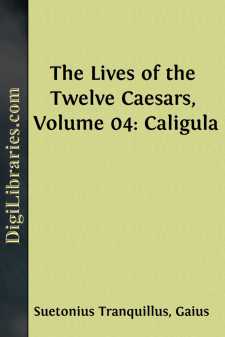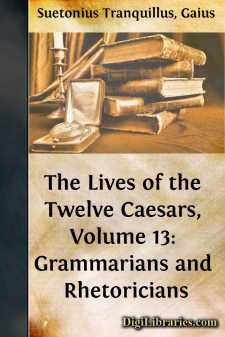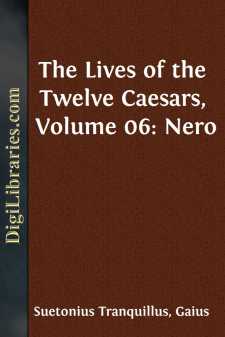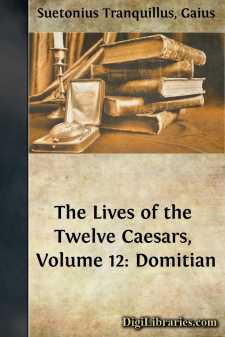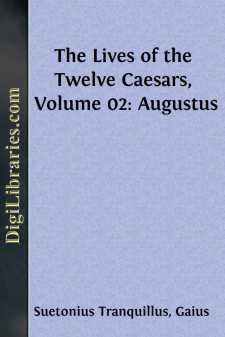Categories
- Antiques & Collectibles 13
- Architecture 36
- Art 48
- Bibles 22
- Biography & Autobiography 813
- Body, Mind & Spirit 142
- Business & Economics 28
- Children's Books 17
- Children's Fiction 14
- Computers 4
- Cooking 94
- Crafts & Hobbies 4
- Drama 346
- Education 46
- Family & Relationships 57
- Fiction 11829
- Games 19
- Gardening 17
- Health & Fitness 34
- History 1377
- House & Home 1
- Humor 147
- Juvenile Fiction 1873
- Juvenile Nonfiction 202
- Language Arts & Disciplines 88
- Law 16
- Literary Collections 686
- Literary Criticism 179
- Mathematics 13
- Medical 41
- Music 40
- Nature 179
- Non-Classifiable 1768
- Performing Arts 7
- Periodicals 1453
- Philosophy 64
- Photography 2
- Poetry 896
- Political Science 203
- Psychology 42
- Reference 154
- Religion 513
- Science 126
- Self-Help 84
- Social Science 81
- Sports & Recreation 34
- Study Aids 3
- Technology & Engineering 59
- Transportation 23
- Travel 463
- True Crime 29
The Lives of the Twelve Caesars, Volume 01: Julius Caesar
Description:
Excerpt
CAIUS JULIUS CAESAR.
I. Julius Caesar, the Divine [3], lost his father [4] when he was in the sixteenth year of his age [5]; and the year following, being nominated to the office of high-priest of Jupiter [6], he repudiated Cossutia, who was very wealthy, although her family belonged only to the equestrian order, and to whom he had been contracted when he was a mere boy. He then married (2) Cornelia, the daughter of Cinna, who was four times consul; and had by her, shortly afterwards, a daughter named Julia. Resisting all the efforts of the dictator Sylla to induce him to divorce Cornelia, he suffered the penalty of being stripped of his sacerdotal office, his wife's dowry, and his own patrimonial estates; and, being identified with the adverse faction [7], was compelled to withdraw from Rome. After changing his place of concealment nearly every night [8], although he was suffering from a quartan ague, and having effected his release by bribing the officers who had tracked his footsteps, he at length obtained a pardon through the intercession of the vestal virgins, and of Mamercus Aemilius and Aurelius Cotta, his near relatives. We are assured that when Sylla, having withstood for a while the entreaties of his own best friends, persons of distinguished rank, at last yielded to their importunity, he exclaimed—either by a divine impulse, or from a shrewd conjecture: "Your suit is granted, and you may take him among you; but know," he added, "that this man, for whose safety you are so extremely anxious, will, some day or other, be the ruin of the party of the nobles, in defence of which you are leagued with me; for in this one Caesar, you will find many a Marius."
II. His first campaign was served in Asia, on the staff of the praetor, M. Thermus; and being dispatched into Bithynia [9], to bring thence a fleet, he loitered so long at the court of Nicomedes, as to give occasion to reports of a criminal intercourse between him and that prince; which received additional credit from his hasty return to Bithynia, under the pretext of recovering a debt due to a freed-man, his client. The rest of his service was more favourable to his reputation; and (3) when Mitylene [10] was taken by storm, he was presented by Thermus with the civic crown. [11]
III. He served also in Cilicia [12], under Servilius Isauricus, but only for a short time; as upon receiving intelligence of Sylla's death, he returned with all speed to Rome, in expectation of what might follow from a fresh agitation set on foot by Marcus Lepidus. Distrusting, however, the abilities of this leader, and finding the times less favourable for the execution of this project than he had at first imagined, he abandoned all thoughts of joining Lepidus, although he received the most tempting offers.
IV. Soon after this civil discord was composed, he preferred a charge of extortion against Cornelius Dolabella, a man of consular dignity, who had obtained the honour of a triumph. On the acquittal of the accused, he resolved to retire to Rhodes [13], with the view not only of avoiding the public odium (4) which he had incurred, but of prosecuting his studies with leisure and tranquillity, under Apollonius, the son of Molon, at that time the most celebrated master of rhetoric....



